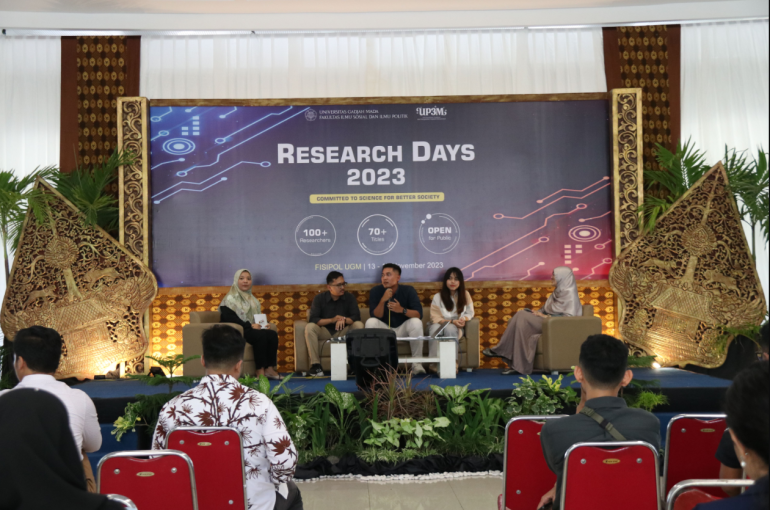
Yogyakarta, November 17th 2023─Policies that are discriminatory and exclusive are still often found in several regions in Indonesia. In response to this, the Faculty of Social and Political Sciences, Gadjah Mada University conducted research entitled “Morality Policies/Politics and the Prospect for Inclusive Citizenship in Decentralized Indonesia: A Study of West Java” in collaboration with the Australia-Indonesia Partnership Towards an Inclusive Society (INKLUSI) and consisting of Wawan Mas;udi, Dean of Fisipol UGM; Erwan Purwanto; Ayu Rahmawati; Ulya Jamson; and Fuji Prastowo. The choice of West Java Province as the focus of this research was not without reason. “West Java (cities) have repeatedly been included in the intolerant index and have the highest number of reported cases of discrimination,” explained Ayu Rahmawati at the Research Days event held on Friday (17/11).
Through the policy review process, this research succeeded in uncovering several patterns of exclusion in policy from the aspects of the policy frame, the policy formulation process, and the strategies used in making policies. From the policy frame aspect, there are 117 morally framed policies out of the 121 policies studied. “Of these 117, 59 of them are manifest and the rest are latent,” explained Ayu. Manifest morally framed policies mean that the good and bad values of something are written explicitly in the policy. Meanwhile, latent morally framed policies mean that moral values are not written explicitly.
“For example, the policy regarding Building Construction Permits seems ordinary. “However, if the building you want to build is a place of worship for a minority group, then the policy can be framed in such a way as to limit the rights of the minority group,” explained Ayu.
From the aspect of policy-making, there are three pathways that are often found in exclusive policy-making, namely the Government-led pathway, Party-led pathway, and Religious group-led pathway. Meanwhile, the strategies used are generally a combination of formal and informal strategies. “For example, there are initiatives that come from (members of) the legislature or certain political parties, but on the other hand there are also public demonstrations organized by community organizations to support the existence of exclusive policies,” said Ayu.
Furthermore, Ayu also explained several situations that could become fertilizer for the development of exclusive policies. “First, politicians must be pragmatic in the sense of needing to secure votes from the majority group. Second, there are conservative religious groups who want to strengthen their position in the policy-making process. Third, there are intolerant voters who tend to choose leaders with identities that match those of the voters. “Fourth, there is no movement from pro-inclusion actors in the area,” said Ayu.
Based on existing findings, the exclusive policy is clearly still ongoing in several regions in Indonesia. There are several recommendations proposed in this research, including the need for a special team tasked with reviewing exclusive policies at national to regional levels and creating strategies to reduce the negative impacts of these policies. Apart from that, it is also important to increase awareness for the government regarding the importance of social inclusion in their programs. Furthermore, the General Election (Pemilu) must also be ensured that it is not used as an opportunity for politicians to make exclusive promises. “It’s not enough just to ban hate speech, we have to encourage political parties to be more inclusive in the campaign and election process,” stressed Ayu. Finally, pro-inclusion actors, including campuses, must also be strengthened and supported.
